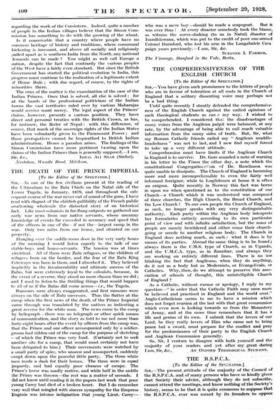THE DEATH OF THE PRINCE IMPERIAL
[To the Editor of the SPECTATOR.] Sin.,--As one of the few civilians present at the reading of the Ultimatum to the Zulu Chiefs on the Natal side of the Lower Tugela, in January, 1879, and throughout the sub- sequent course of the war never out of sound of the guns, I have read with disgust of the childish gullibility of the French public swallowing wholesale -the distorted story of an historical fact. Like most colonists in far-flung outposts we gathered our early war news from our native servants, whose uncanny knowledge of events far exceeded in accuracy and speed that of the officers in one of the—if not the—largest camp in the war. Only two miles from our house, and situated on our property.
Hanging over the saddle-room door in the very early hours of the morning I would listen eagerly to the talk of our stable-boys and house-servants. The tension was at times electrical. All of them were Zulu refugees, or the children of refugees born on the border, and the fear of the Zulu King Cetewayo was born in them, and I absorbed it. They believed implicitly in the invulnerability and ultimate success of the Zulus, but were extremely loyal to the colonists, because, in the event of a reverse, they stood no more chance than we did ; and I used to listen to the thrilling things that would happen to all of us if the Zulus did come across—i.e., the Tugela.
Rumours were always exaggerated, and first rumours were always on the side of Zulu successes. Thus the flutter at the camp when the first news of the death of the Prince Imperial caine through was translated by the natives as indicating a' great reverse for the white man. The news came to the camp by heliograph—there was no telegraph or other quick means of communication, and the story as told to me not more than forty-eight hours after the event by officers from the camp was, that the Prince and one officer accompanied only by a soldier- groom had ridden out of the camp for the purpose of sketching —of which the Prince was very fond. (Certainly not to seek another site for a camp, that would most certainly not have been delegated to him.) Their movements were watched by a small party of spier, who unseen and unsuspected, suddenly swept down upon the peaceful little party. The three white men made a dash for their horses. The three were in equal jeopardy, and had equally poor chances of escape. The Prince's horse was madly restive, and while half in the saddle the Prince was thrown—the rest was a matter of seconds. I did not know until reading it in the papers last week that poor young Carey had died of a broken heart. But I do remember very well that mingled with sincere sympathy for the Empress Eugenie was intense indignation that young Lieut. Carey—
who was a mere boy--should be made a scapegoat. But it was ever thus ! At every disaster somebody took the blame, as witness the nerve-shaking (to us in Natal) disaster of Jsandhlawana, which was put to the credit of poor one-armed Colonel Durnford, who lost his arm in the Langabalele Cam paign years previously.—I am, Sir, &c.
SUZANNE I. FARMER..
The Vicarage, Stanford in the Vale, Berks.




































 Previous page
Previous page